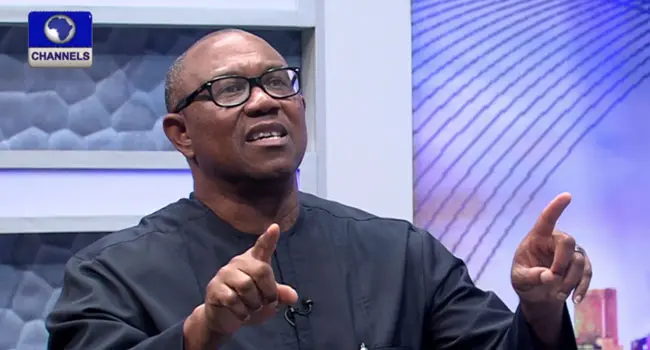Peter Obi, the presidential candidate of the Labour Party in a tweet has provided solution for the crashing of dollars as he urged the government and Nigerians to stop using foreign currencies like the US dollars for local transactions.
He disclosed this in a recently posted tweet, where he stated that Nigeria’s confidence in the national currency needed to be restored.
This comes on the heels of a massive depreciation in Nigeria’s local currency.
The Naira has nosedived to a record low of N720/$ creating an astounding gap between the official rate and the black market rate.
What Peter Obi is sayinghttps://twitter.com/PeterObi/status/1553035988645122053?ref_src=twsrc%5Etfw%7Ctwcamp%5Etweetembed%7Ctwterm%5E1553035988645122053%7Ctwgr%5E4a2c6c43e4d9f03fe04884dc923a54b2a5e02f51%7Ctwcon%5Es1_c10&ref_url=https%3A%2F%2Fnews-af.feednews.com%2Fnews%2Fdetail%2F96944cc5ce5ee6b311b8911988ec29f9
The Presidential candidate for the Labour Party stated that economic hardship and fiscal pressures have led to the plunge of the Naira.
He said, “Distortions in the economy and fiscal policies have triggered instability of the Naira, The plummeting exchange rate is worrisome.”
He added that Nigeria should stop using foreign currency to pay for domestic activities and contracts.
He said, “The Fiscal Managers should come up with a policy line or modality for arresting the value drift and restoring confidence in the National currency.
Also, denominating domestic transactions and contracts in foreign currency should be stopped forthwith.”
What you should know
It is important to note that the greatest naira depreciation in history is being fueled by the CBN’s money supply growth rate.
This is because the rate of inflation in an economy is one of the quantitative factors which impacts a currency’s exchange rates.
In particular, if your economy’s inflation rate is low, you should anticipate drawing more foreign investment than comparable nations with greater inflation rates.
On the other hand, if an economy has a high rate of inflation, the impact on the currency is like a double-edged sword.
The amount of money supply in the Nigerian economy is at its highest level on record at about N48.8 trillion while currency in circulation is above N3 trillion for 8 straight months.
Demand deposits, which are money held by banks on behalf of the customers are also at an all-time high of N17 trillion.
Nigeria’s inflation rate climbed to its highest level in half a decade, and the fifth consecutive monthly rise.
inflation rate in the month of June 2022, surged further to 18.6% compared to 17.71% recorded in the previous month.
The last time the inflation rate in Nigeria touched the 18.6% ceiling was January 2017, when it stood at 18.72%.
Nigeria’s foreign reserve continued on its downturn with a 0.07% decline to stand at $39.25 billion on Wednesday, 27th July 2022 compared to $39.27 recorded the previous day.
Notably, the external reserve has dipped by $196.71 million in one week, following the recent volatility in the exchange rate markets.


